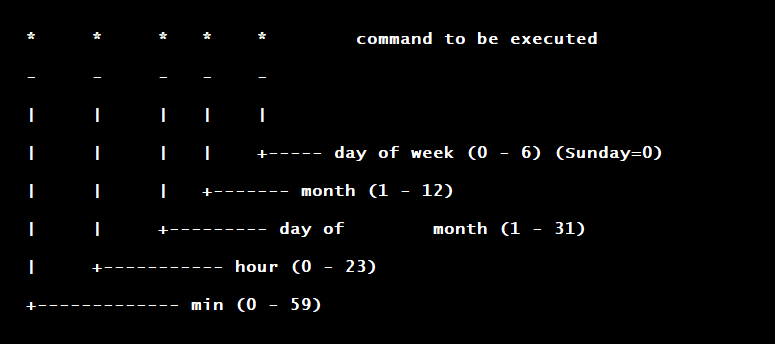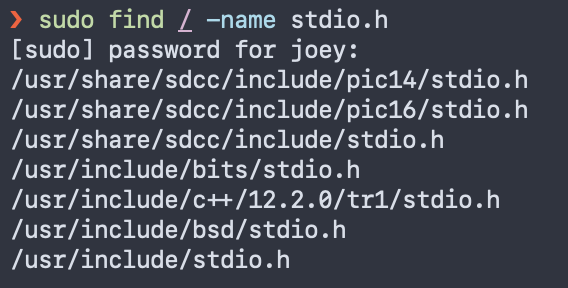diff options
| author | garhve <git@garhve.com> | 2023-02-14 18:29:13 +0800 |
|---|---|---|
| committer | garhve <git@garhve.com> | 2023-02-14 18:29:13 +0800 |
| commit | 734f042c9d99e0110d5e4cf8f2994a5ce27385d1 (patch) | |
| tree | 4b825dc642cb6eb9a060e54bf8d69288fbee4904 /content/post/mess with bash(1).md | |
| parent | 92e08c404fa53f304dec7490c4acb4b45dd0d7df (diff) | |
delete zola
Diffstat (limited to 'content/post/mess with bash(1).md')
| -rw-r--r-- | content/post/mess with bash(1).md | 158 |
1 files changed, 0 insertions, 158 deletions
diff --git a/content/post/mess with bash(1).md b/content/post/mess with bash(1).md deleted file mode 100644 index 7b5c55a..0000000 --- a/content/post/mess with bash(1).md +++ /dev/null @@ -1,158 +0,0 @@ -+++ -title = "Mess with bash(1)" -date = 2022-08-25 -[taxonomies] -categories = ["code"] -tags = ["bash"] -[extra] -math = false -+++ -### Crontab - -`crontab` is a useful tool, I really regret that I don't familar it earlier. - -It's usage really simple, and these two are my frequent using: - -```bash -crontab -e #edit crontab file that reside in /var/spool/cron -crontab -l #list current crontab job -``` - -It basic syntax as follow, also really simple - - -example of usage: - -1. delete file *foo* every minute - `* * * * * rm foo` -2. delete file *foo* every 15 minutes - `15 * * * * rm foo` -3. delete file *foo* every beginning of hour - `0 * * * * rm foo` -4. delete file *foo* every minute after 3 hours - `* 3 * * * rm foo` -5. delete file *foo* every day at 18:30 - `30 18 * * * rm foo` -6. delete file *foo* every beginning of month - `0 0 0 * * rm foo` -7. delete file *foo* on beginning of 1st,10th of month - `0 0 1,10 * * rm foo` - -The usage really simple, I now use it to renew my SSL certification and daily update bt-tracker. - ---- - -### tr - -`tr` is really useful when encountered situation that needs struggle with string. -Three frequency ways of using `tr` - -1. **shrink** multiple characters into single one - - `tr -s '[string]'` - e.g. `echo "ssssssspaaaaace" | tr -s 'sa'` would convert "ssssssspace" to "space" -2. **delete** specific character. I usually use it to delete white space or delimiter - - `tr -d '[string]'` - e.g. `echo "blog.garhve.com" | tr -d '.o'` would convert url to "blggarhvecm" -3. **convert** specific character to another one. - - `tr '[string1]' '[string2]'` - e.g. `echo "woopwon | tr "wo" "fe"` would result "feepfen" - ---- - -### cut - -I use `cut` mostly to get word from a string, especially get relative path from absolute path. Because I always want to loop to get same sub-directories file from different main directory, `cut` helps a lot. - -for now, I only use it one way - -`echo string | cut -d '[character]' -f position` -e.g. `echo path/to/most/inner/file | cut -d '/' -f1` this will give me word before first '/', which is 'path' - -Often, `rev` will co-work with `cut` to get last one word - -e.g. `echo blog.garhve.com | rev | cut -d '.' -f 1 | rev` this will give word after last '/', which is com. - -> *a worth noting here is that the `rev` command needs to appear twice because it usage is not so intuitive, it reverse whole string* -> -> `echo "hello world" | rev` will get 'dlrow olleh` -> -> `echo "hello world" | cut -d ' ' -f1 | rev` will give result of 'dlrow' -> -> `echo "hello world" | rev | cut -d ' ' -f1` will give same result, as 'dlrow' -> -> `echo "hello world" | rev | cut -d ' ' -f1 | rev` will give expected result, as 'world' - -### Daily update bt tracker - -I already learn shell script for a while.. so I wrote a simple script to test whether I really got used to it, but result is obviously, I need more and more practice to memorize commands. - -```bash -#! /bin/sh -#bt-tracker.txt -site=https://raw.githubusercontent.com/ngosang/trackerslist/master/trackers_all.txt - -file=/path_to_aria_directory/aria2.conf - -Addr=user@addr - -# Get bt-tracker and format it to fulfill aria needs, then store in variable -bt=$(curl $site | tr -s '[:space:]' | tr '[:space:]' ',') - -# sshpass is a software, that can allow me pass ssh password as argument -# so that I don't need to wait prompt -# 410 is the line of bt tracker resides, I now no other way to replace it. -$(sshpass -p 'password' ssh -T $Addr "sed -i '410d' $file | echo $bt >> $file") -``` - -> Usage of [tr](https://blog.garhve.com/index.php/archives/23/#tr) and [cut](https://blog.garhve.com/index.php/archives/23/#cut), expansion of 'command tips' is needed - -### Ways to find files or specific string in files - -In order to look up C definitions, I need to know where linux stores header files or which files store definitions I need. So that here comes up some methods to fulfill this need: - -1. `find 'path' -name 'file_name'` - -> e.g. `find / -name stdio.h` will return multiple location that stdio.h resides. this could expand to look for others -> ->  -> -> more info could see `man find` - ---- - -2. `grep -rnw 'path' -e 'pattern'` - -> e.g. `grep --include=\*.{h,c} -rnw / -e "from_kuid" will return string and filename that contains string. -> ->  -> -> * `-r` or `-R` is recursive, -> * `-n` is line number, and -> * `-w` stands for match the whole word. -> * `-l` (lower-case L) can be added to just give the file name of matching files. -> * `-e` is the pattern used during the search -> -> Along with these, `--exclude`, `--include`, `--exclude-dir` flags could be used for efficient searching: -> -> * This will only search through those files which have .c or .h extensions: -> -> ```bash -> grep --include=\*.{c,h} -rnw '/path/to/somewhere/' -e "pattern" -> ``` -> -> * This will exclude searching all the files ending with .o extension: -> -> ```bash -> grep --exclude=\*.o -rnw '/path/to/somewhere/' -e "pattern" -> ``` -> -> * For directories it's possible to exclude one or more directories using the `--exclude-dir` parameter. For example, this will exclude the dirs dir1/, dir2/ and all of them matching *.dst/: -> -> ```bash -> grep --exclude-dir={dir1,dir2,*.dst} -rnw '/path/to/somewhere/' -e "pattern" -> ``` -> -> more info could see [man grep](https://ss64.com/bash/grep.html). |
